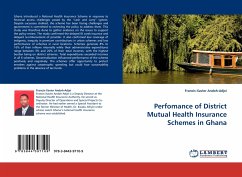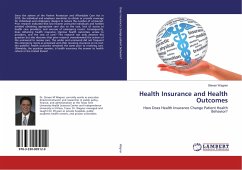
Perfomance of District Mutual Health Insurance Schemes in Ghana
Versandkostenfrei!
Versandfertig in 6-10 Tagen
32,99 €
inkl. MwSt.

PAYBACK Punkte
16 °P sammeln!
Ghana introduced a National Health Insurance Scheme in response to financial access challenges posed by the cash and carry system. Despite successes chalked, the scheme has been facing challenges and government is committed to reviewing the policy to address them. This study was therefore done to gather evidence on the issues to support the policy review. The study confirmed the delayed ID cards issuance and delayed re-imbursement of provider. It also confirmed low coverage of indigents, inequity in premium contributions in urban schemes and low performance of schemes in rural locations. Schem...
Ghana introduced a National Health Insurance Scheme in response to financial access challenges posed by the cash and carry system. Despite successes chalked, the scheme has been facing challenges and government is committed to reviewing the policy to address them. This study was therefore done to gather evidence on the issues to support the policy review. The study confirmed the delayed ID cards issuance and delayed re-imbursement of provider. It also confirmed low coverage of indigents, inequity in premium contributions in urban schemes and low performance of schemes in rural locations. Schemes generate 8% to 16% of their inflows internally while their administrative expenditures range between 3% and 20% of their total incomes, with the highest burden being on district schemes. Total expenditures exceeded incomes in all 6 schemes. Decentralization influenced performance of the scheme positively and negatively. The schemes offer opportunity to protect enrolees against catastrophic spending but could face sustainability problems in the absence of tax funds.












